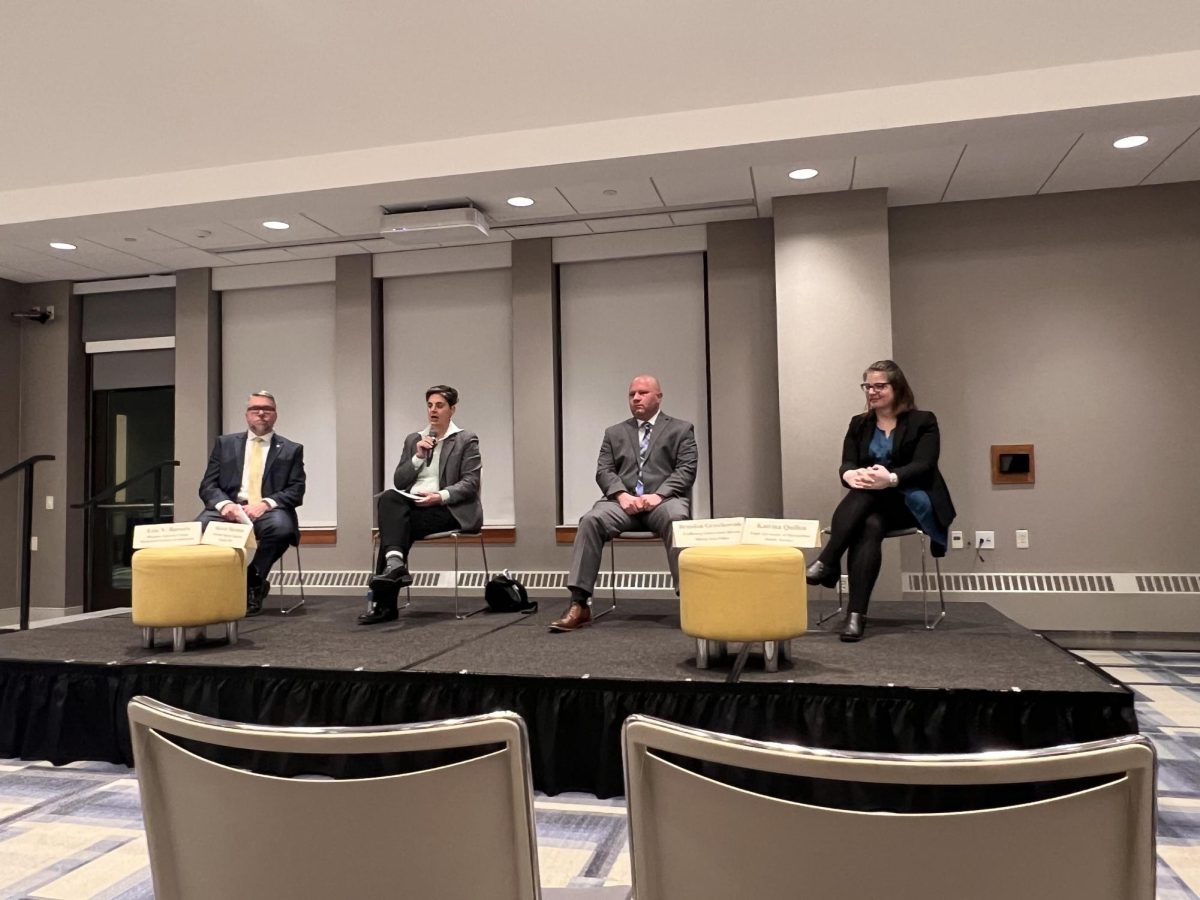Human Trafficking Prevention month serves as an urgent reminder that trafficking is everywhere. Meaningful conversations are necessary to impact change and spread awareness.
This year was the eighth annual panel discussion to bring more awareness to human trafficking at Millikin. It is open to students, faculty, and external community members. Every year the panelists are different in order to frame a certain aspect of the issue. This year was heavily focused on law enforcement and legal counsel for survivors. The panelists were Eric Bowers from Homeland Security Investigations, Karen Marinos from the Federal Bureau of Investigation, Brandon Grzechowiak from the Illinois State Police, and Katrina Quillen from Legal Aid Society of Metropolitan Family Services.
“I am a member of the Central Illinois Human Trafficking Task Force and then the statewide task force and so that’s how I’ve been able to do this for eight years with virtually no money because I know all these people from working on the task force,” Laura Dean, Millikin’s Associate Professor of Political Science who also runs the Human Trafficking Research Lab, said.
At the beginning of the event, Dean reminded all attendees that according to the Bureau of Justice statistics 1,912 people were referred to U.S. attorneys for human trafficking offenses in 2022 which is a 26% increase from 2012. The number of people convicted of human trafficking offenses nearly doubled from 578 in 2012 to over 1,000 in 2022. These key statistics set the tone for the evening to draw attention to how pervasive trafficking is today.
“I think it really helps close the gaps between law enforcement and the community,” Grzechowiak, Lieutenant and Investigative Support Command, said. “We’re able to put a ton of information out that maybe the public doesn’t have about what law enforcement is doing and our partnerships with a lot of our victim resources as far as it pertains to trafficking.”
All of the panelists were asked a series of questions and given an opportunity to respond based on their unique perspective and experience in the field. A major point of conversation was of coercion that can often result in cases of forced criminality. This implies that a trafficker forces someone to commit a crime when they are trafficked. This can cause victims of trafficking to hesitate about cooperating with law enforcement because they are fearful of arrest. Forced criminality is a huge barrier that exists within trafficking since in so many cases survivors do get arrested even when the crime was not committed of their own volition. Grzechowiak has been working to support new proposed legislation that would be geared towards protecting victims of human trafficking through expungement of criminal records that were the result of forced criminality.
“Whenever we put together these legal packages, these legislative packages, with our individuals there are people in the state police that are specifically assigned to help draft legislation and help meet with legislators to make sure the laws were properly written. This is kind of what we do to see them through,” Grzechowiak said.
He also offered sound advice to students or people who want to be more involved in the process.
“Pay attention to when bills come out and show support or even propose some ideas,” he said.
Another relevant challenge associated with trafficking is largely due to the current political landscape regarding immigration. It is already difficult to get survivors to come forward, especially those who fear deportation. There are concerns that the stricter immigration policies will further inhibit progress to identify real victims and provide them with the assistance they need. Some of these problems in reporting can also be traced back to rhetoric around law enforcement in general and the fear associated with people in those positions.
“I think that the problem is going to get worse because it’s going to go underground because of all the fear of reporting,” Quillen, Supervising Attorney, said. “I think that the potential survivors of trafficking who would have come forward, they are going to be much more hesitant to do that. Trafficking is just going to go further and further underground and be harder to detect and harder to prosecute and harder to find a survivor who’s willing to cooperate.”
Millikin is home to the only Human Trafficking Lab in the state of Illinois, those who participate do research for the Central Illinois Human Trafficking Task Force. They keep tabs on trafficking-related training and where more training might be necessary in the future, review arrest data, and conduct further analyses on specific Illinois counties. Dean’s initial interest in trafficking came from her experience studying abroad during college and witnessing it in plain sight. Since then, she discovered a true passion for spreading awareness and taking part in purposeful work to combat it.
“In politics today, human trafficking is an issue that can bring people together and hopefully people from both different political parties. Much of the anti-trafficking legislation and the laws in the U.S. have actually been passed with bipartisan support,” Dean said.
Not only did the event include a panel discussion, but multiple community organizations also attended and hosted informational tables related to trafficking or victim services. One group in particular that has roots in the Decatur area, as well as throughout Illinois, is Growing Strong. They are a nonprofit that serves Macon, Moultrie, DeWitt, Pyatt, and Shelby counties. Their services are free and they are sexual violence survivor-oriented. Their services include counseling (virtual and in-person), support groups, preventative action, medical/legal advocacy, education and professional training, as well as a 24/7 hotline. The services are confidential and all volunteers at the organization must undergo 40 hours of training.
“We will never push someone to do anything. Support is our main concern and our main place that we can step in and help someone. Another thing I think Millikin students should know is we’re not just serving survivors, we’re also serving loved ones,” Rebecca Madden, a Prevention Education Supervisor at Growing Strong, said. “So there’s a support system as somebody who has a loved one who’s experienced sexual violence. How do I support someone else without supporting myself?”
Growing Strong is always looking for additional volunteers who are passionate about helping others. Potential volunteers must be willing to complete the mandatory training, but there are many ways to get involved once the requirement has been satisfied. They encourage volunteers to participate in a way that aligns with personal strengths and skill sets.
“I grew up struggling with my own mental health and then being a survivor myself, I wanted to be able to help other people that have had that experience because it is very, sort of like life-shattering when it happens,” Lea Cameron, a Crisis Counselor at Growing Strong, said. “Being able to meet someone when they’re in that position and be that support that they need that I feel like I didn’t have when I was in that position. So I’m happy to be able to do that. It’s been really awesome.”
Human trafficking is a serious issue and one that Millikin has made great efforts to provide educational opportunities for students to learn about through the Human Trafficking Lab, discussions, and course offerings. For further involvement, volunteer with victim services organizations, contact local legislators about proposed policies, stay informed, and stay vigilant in identifying warning signs of possible trafficking.
“Human trafficking is a global issue and it’s increasingly getting worse as the days go on. I think more awareness is better than none, and I think everyone should be aware about the effects of human trafficking, what to look for, and who to talk to about it,” Jenny Brooks, a Criminal Justice major and panel attendee, said.
If you have experienced or know someone who could be dealing with trafficking, please contact the appropriate authorities. You can also call the National Human Trafficking Hotline at 1-888-373-7888 or the Center for Prevention of Abuse Crisis Hotline at 1-800-559-7233. For all survivors of trafficking, help is available and there are people who want to assist in any way they can.
“I see you,” Quillen said.


